We’ll be live streaming tonight’s OpenGov Chicago Meetup here on the website via Google Plus. We’ll start our broadcast at about 6:15 CST. You can follow along in our meeting notes using the google doc here.
We’ll be live streaming tonight’s OpenGov Chicago Meetup here on the website via Google Plus. We’ll start our broadcast at about 6:15 CST. You can follow along in our meeting notes using the google doc here.
 When we kicked off the first annual Civic Innovation Summer here in Chicago, no one knew what to expect. Starting in July, there would be ~150 high school- and college-age teenagers from across the city gathered together every Friday for six weeks in order to learn about technology and open data. Sounds deceptively simple until you start to ask the right questions: Who are these students? What kind of technology do they have access to in their everyday lives? What do they need to learn from us in order to take that next step in their academic or professional lives?
When we kicked off the first annual Civic Innovation Summer here in Chicago, no one knew what to expect. Starting in July, there would be ~150 high school- and college-age teenagers from across the city gathered together every Friday for six weeks in order to learn about technology and open data. Sounds deceptively simple until you start to ask the right questions: Who are these students? What kind of technology do they have access to in their everyday lives? What do they need to learn from us in order to take that next step in their academic or professional lives?
The students we taught this summer were brought together thanks to the Mikva Challenge, which develops the next generation of civic leaders, activists, and policy-makers; and Free Spirit Media, which provides education, access, and opportunity in media production. These organizations had done summer programs with Chicago youths in the past, but neither had experience joining forces to come up with a truly strong technology curriculum targeted at the average Chicago Public School student.
That’s where Smart Chicago stepped in to put together the first ever Civic Innovation Summer (more than 500 images here). Thanks to a grant from the John D. and Catherine T. MacArthur Foundation, as well as support from the Chicago Community Trust, the Smart Chicago Collaborative was able to develop and deliver an over-arching summer curriculum that would ultimately inspire students to be more curious, try more things, and become technologists in their own right.
But Jacqui, you’re not a teacher
First, let me tell my own story about how I got to be standing in front of ~170 people (students + staffers) every Friday for six weeks to teach them about technology. A lifelong nerd, I had recently become Editor at Large at renown online technology mag Ars Technica. I had previously been part of that amazing family of techno-journalists for 8 years (and before that, a back-end Web programmer), but I felt the itch to get more civically involved in my beloved city of Chicago. As the late Ron May once asked me while shoving a recorder in my face, “How can you be a technologist in Chicago but not be involved in Chicago?”

I touched base with Smart Chicago Collaborative Executive Director Daniel X. O’Neil, who is famed in the Chicago tech scene in his own right. Recognized as a co-founder of EveryBlock (R.I.P.) and the person who helped spearhead much of Chicago’s open data initiatives, Dan and I were able to combine forces to put together the kind of tech curriculum that public high school students are rarely exposed to. (I attended a public high school myself out in suburban Chicago, which itself had infinite resources compared to the students in the Chicago Public School system. Still, we barely had what one might consider to be “modern” tech education.)
Dan had some ideas for where he wanted the curriculum to go, and put me in charge of developing it into something we could teach over the course of the summer. This being the first time such a program had been put together here in Chicago, there were, unsurprisingly, some bumps in the road. But now that the program is over and school is on the verge of starting again, we feel confident looking back and saying that the first Civic Innovation Summer was a success, and we look forward to improving on it with the goal of reaching even more students in the future.
So what did we learn?
First, I should probably discuss what we ended up teaching. Part of the goal of Smart Chicago heading up Civic Innovation Summer (or as we’ve been calling it with the youths, #civicsummer) was to make the curriculum itself open: open to the students, open to the public, open to other organizations. As such, we chose to publish most of the Powerpoint presentations we created to go along with our sessions, so you’re free to check them out on the Smart Chicago website anytime.
Ultimately, we ended up having five four-hour Friday sessions with all ~150 students, and five customized two-hour sessions for each of the five different groups of students. Those groups consisted of:
A Juvenile Justice Council dedicated to addressing issues with incarcerated youth
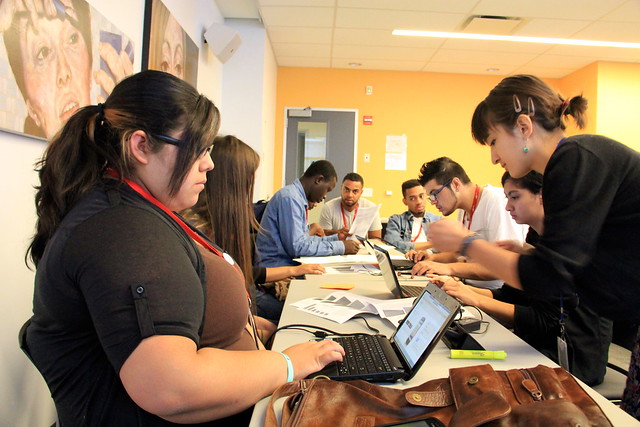
A Health Council dedicated to researching and proposing new ways to educate CPS students about (largely) sex and health

An Education Council dedicated to representing the voices of young people in today’s education debate
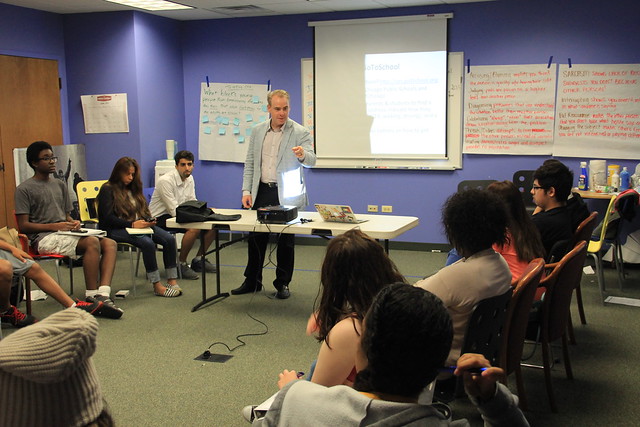
Aldermanic Fellows dedicated to highlighting the voice of youth in each of Chicago’s 50 districts
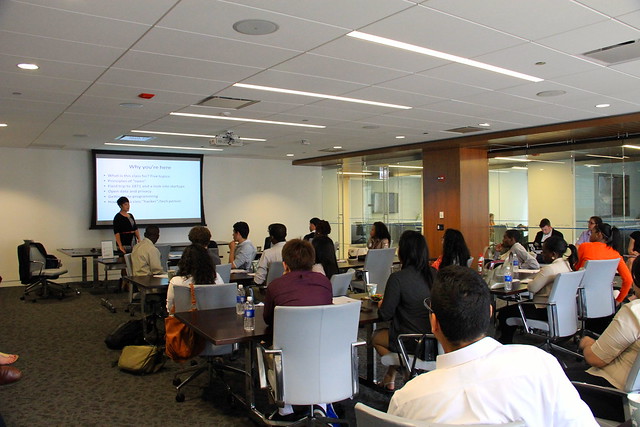
A Mayoral Youth Commission dedicated to interfacing directly with Mayor Emanuel

And a Documakers group dedicated to creating the kind of citizen journalism that is so necessary from our young people today
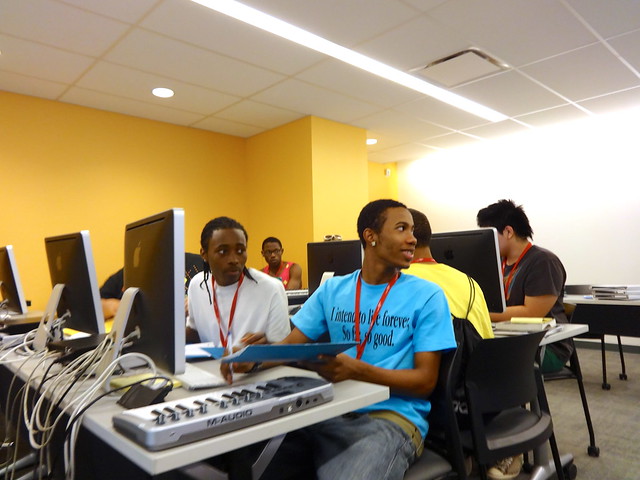
Each group brought its own perspective to #civicsummer; we were bombarded with questions related to each of their summer projects, and the students came to us with a wide range of technology experience. This made developing a once-a-week curriculum for the combined group somewhat challenging, and we ended up going off-Powerpoint many times in order to address the students’ wide range of technological needs.
Still, according to feedback from the students themselves, what we ended up with was a strong curriculum that provided an exciting baseline for teenagers looking to go further into technology, either academically or professionally. A session on coding HTML that we threw together on the fly thanks to changing computer resources ended up being the single most popular thing we did all summer–so many of the students praised the HTML session in their exit surveys that it’s almost worth exploring turning that into a summer program on its own.
The second most popular thing we did all summer was take the students on a tour of 1871, Chicago’s largest and most popular digital startup center. The students were enamored with seeing a workplace that was less of a boring office building and more of a creative space for tech people with new ideas.
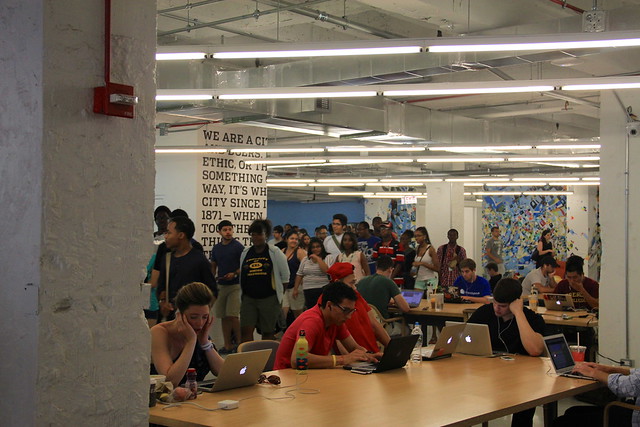
And finally, we were lucky enough to score some major speakers throughout the summer–Harper Reed, Clint Ecker, Dylan Richard, and Dan Carson topped the list for getting the students excited and engaged in learning how to manipulate technology in fun ways.
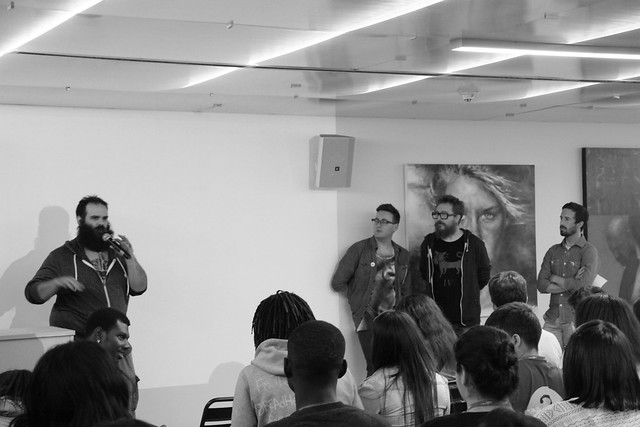
Speakers like project manager Mari Huertas, data analyst Rayid Ghani, UI/UX designer Jason Kunesh were also popular for answering questions about what they do and their own paths to working in technology. And I’m not just saying that: many students specifically named their favorite speaker (or speakers) from #civicsummer and requested more like them for the future.
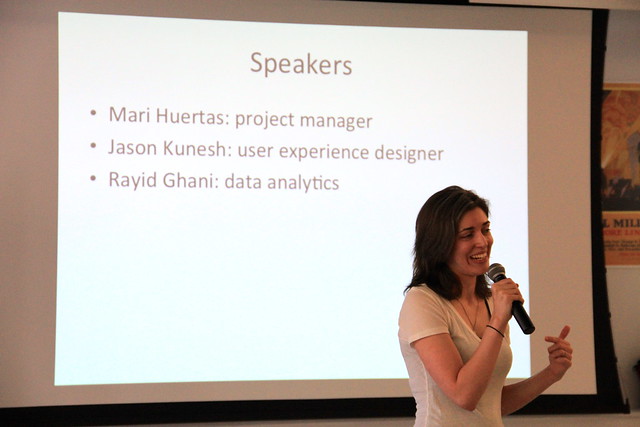
There were other things we learned, too. Namely, they were much more savvy about the Internet and privacy than we expected going in. Most of them were open to sharing their social media lives directly with us, and they were very in-the-know about privacy concerns and settings on the various social networks. We adults like to joke that young people today will be haunted by social media, but I think it’s more accurate to say that they’re making clear decisions about what they’re posting, how to control who sees it, and how to remove those posts when they’re ready. (There’s an argument to be made that our posts online are never fully removable, but students seem to be aware of that than most adults I know today.)
We also learned that students in general need a lot of interactive and video content–a lot. We went in prepared to do a number of university-style lectures, which ultimately wasn’t the best format for a group made of hundreds of teenagers. The lecture format could be better delivered if it’s constantly changing and engaging–the times we showed videos and/or broke into live Internet demos were certainly the most lively. Yet even better would be (more) ability to break the students into small workgroups, and to get the students in front of computers more often for live hands-on tech sessions. We hope to incorporate these things heavily into our planning for future programs like this.
Ultimately, we came out lucky. The students were a joy to work with and used peer policing in order to keep each other in check. And the students loved meeting each other–these smaller groups don’t usually get to interact much, and they were delighted by the ability to come together and meet other youths like them from across Chicago. On our last day, many asked: will we be doing #civicsummer again?
We’re planning on it. Stay tuned.
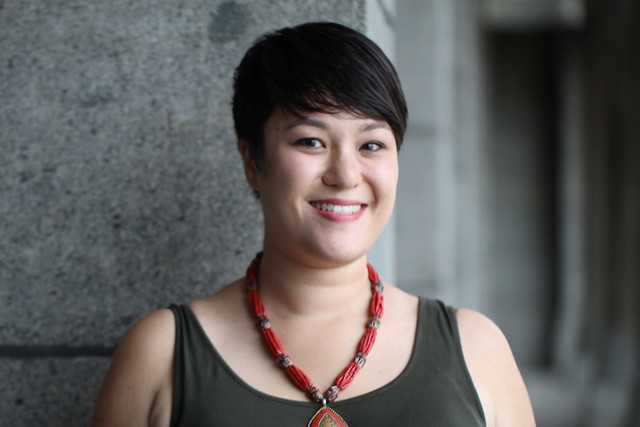
Tonight Fox 32 9 o’clock news did a story on the civic hacking community here in Chicago. Great stuff, including extensive coverage of OpenGov Hack Night and the presentation about a possible app for restaurant workers.
Hackers use their skills to make Chicago more “user-friendly”
FOX 32 Chicago News Story: Hackers use their skills to make Chicago more `user-friendly` from Daniel X. O’Neil on Vimeo.
Here’s the Rap Genius annotation for the story, with lots of links and some clarifications:
Fox 32 News Chicago – Hackers use their skills to make Chicago more `user-friendly’ Lyrics
And complete text:
Hackers use their skills to make Chicago more `user-friendly`
CHICAGO (FOX 32 News) –
Usually when you think about computer hackers, you think of people doing something illegal with your bank account, but now, a group of people are redefining the term by using their technology skills to develop useful websites that will benefit people living or visiting Chicago.
It’s called “civic hacking” and the city is partnering with private groups and volunteers to try and make life better in Chicago. It’s part of the Smart Chicago Collaborative that has already developed more than 50 apps all aimed at solving city problems, while fostering open government.
All the information used in the apps comes from public city data bases. It’s a trend that more and more cities across the country are doing, but Chicago is among the leaders.
If you’ve ever had your car towed and wondered where it was taken, you are not alone. Who can forget the frustration shared by hundreds of people after the blizzard of 2011 when their vehicles were towed and it took days for some people to find them?
Wasmycartowed.com wasn’t available then or it might have alleviated a lot of angst. Now, using city data, the website allows you to find your towed car simply by putting in the license plate.
It’s an app developed by volunteers working at hack nights sponsored by Open City Apps in cooperation with the Smart Chicago Collaborative.
“We have web developers, designers, data analysts and community organizers that come together to come together to talk about civic issues and how we can use our technology skills to solve those problems,” Smart Chicago Collaborative’s Christopher Whitaker explains.
One of the projects some hack night teams are working on is an open trip planner app similar to Google maps, but one that making using the new Divvy Bikes a lot easier by incorporating info about bike stations.
“So it can give you walking directions to that particular spot, and then it can also give you biking directions from one station to another, so it’s all, sort of encompassing in one spot,” Derek Eder of Open City Apps says.
Other available apps include chicagocouncilmatic.org which allows people to track legislation by subject or by alderman.
There’s another to help find flu shot locations, and one to track complaints about food poisoning on Twitter.
“So if you go to Twitter and complain about food poisoning we have a listener for that, some software that listens for that and we tweet back at you including people from the
Chicago Department of Public Health,” Executive Director Daniel O’Neil says.
That app would provide info to the Health Department so it could send an inspector to the restaurant in question.
Today Smart Chicago was featured, along with many others, in a story in the Wall Street Journal covering the great work of civic hackers in Chicago:
Hackers Called Into Civic Duty
Chicago, Other Cities Work With Programmers to Leverage Data Troves for Public Purpose
Snip:
“People still think hacking is getting people’s credit-card numbers from J.C. Penney,” said Daniel X. O’Neil, executive director of the Smart Chicago Collaborative, a nonprofit using technology to improve city life. “Now we work pretty closely with the city and the state.”
Smart Chicago consultant Christopher Whitaker reviewed the Open311 project brought to Chicago through a grant to Code for America:
Christopher Whitaker, who heads Chicago’s Code for America team, also showed off 311 Service Tracker Chicago, a program from his group and the city that helps residents track the status of service requests for things such as removing abandoned vehicles or filling potholes.
“Now, when you file a request in Chicago, you get a tracking number like you would from UPS,” Mr. Whitaker said. People can go to the website, enter the tracking number and see which city department is working on the problem and the status of the request.
Full story:
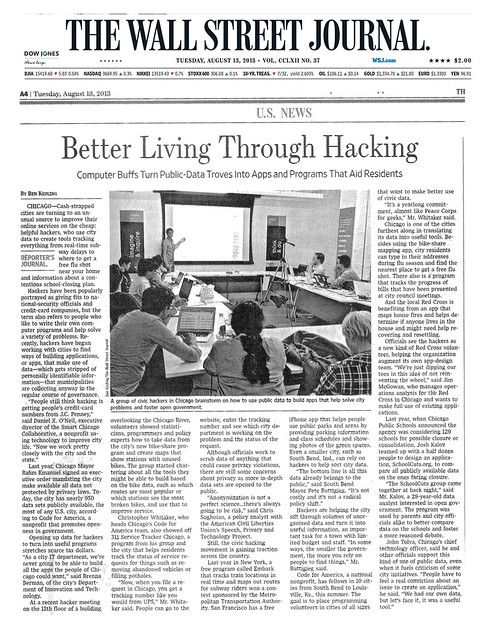
Here’s some coverage of the Foodborne Chicago project today.
The main story was on the front page of the Chicago Tribune: Food-poisoning tweets get city follow-up: Health authorities seek out sickened Chicagoans, ask them to report restaurants. It was a very complete story, with detailed custom graphics on the process we follow to manage incoming tweets:
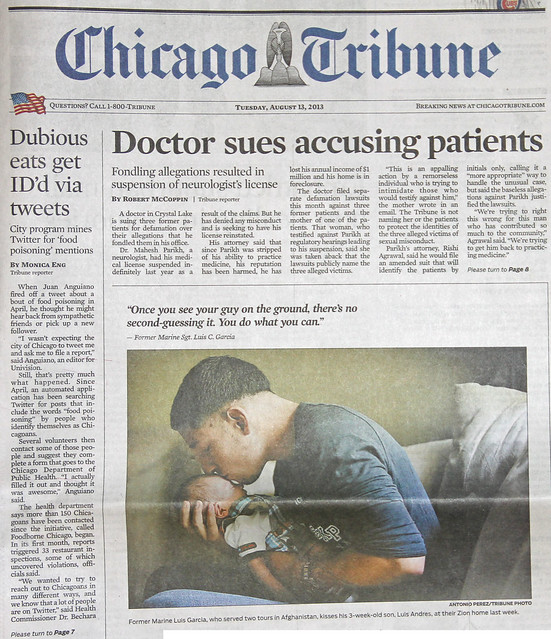
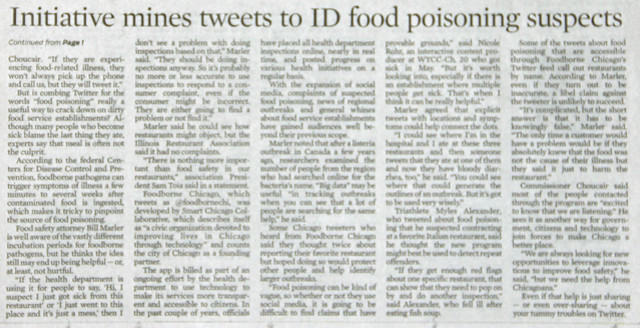
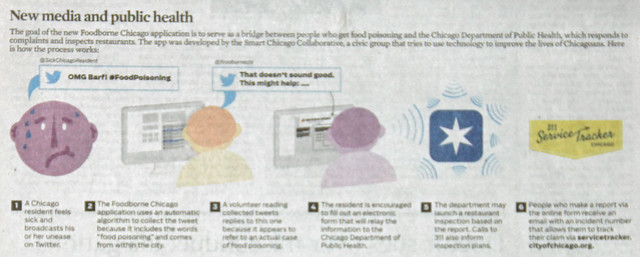
The same story was used as the front page of the Red Eye in a package called “#DirtyDining: Trending Toxic:

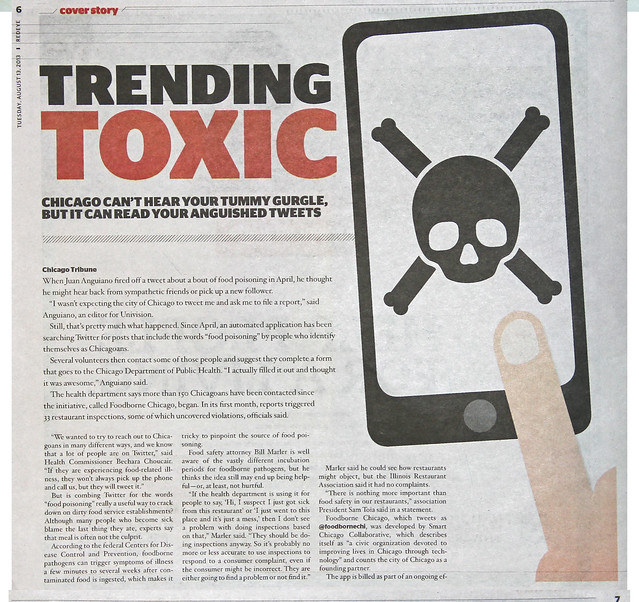
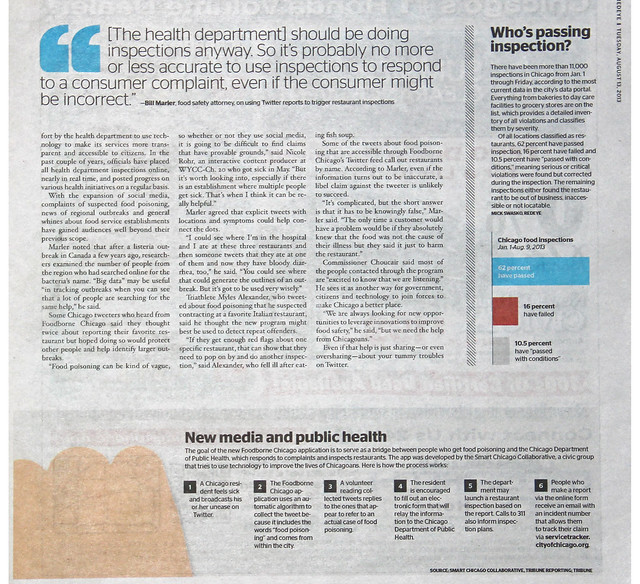
Here’s the full story:
Food-poisoning tweets get just desserts
Health authorities seek out sickened Chicagoans, ask them to report restaurants
By Monica Eng, Chicago Tribune reporter
August 13, 2013
When Juan Anguiano fired off a tweet about a bout of food poisoning in April, he thought he might hear back from sympathetic friends or pick up a new follower.
“I wasn’t expecting the city of Chicago to tweet me and ask me to file a report,” said Anguiano, an editor for Univision.
Still, that’s pretty much what happened. Since April, an automated application has been searching Twitter for posts that include the words “food poisoning” by people who identify themselves as Chicagoans.
Several volunteers then contact some of those people and suggest they complete a form that goes to the Chicago Department of Public Health. “I actually filled it out and thought it was awesome,” Anguiano said.
The health department says more than 150 Chicagoans have been contacted since the initiative, called Foodborne Chicago, began. In its first month, reports triggered 33 restaurant inspections, some of which uncovered violations, officials said.
“We wanted to try to reach out to Chicagoans in many different ways, and we know that a lot of people are on Twitter,” said Health Commissioner Bechara Choucair. “If they are experiencing food-related illness, they won’t always pick up the phone and call us, but they will tweet it.”
But is combing Twitter for the words “food poisoning” really a useful way to crack down on dirty food service establishments? Although many people who become sick blame the last thing they ate, experts say that meal is often not the culprit.
According to the federal Centers for Disease Control and Prevention, foodborne pathogens can trigger symptoms of illness a few minutes to several weeks after contaminated food is ingested, which makes it tricky to pinpoint the source of food poisoning.
Food safety attorney Bill Marler is well aware of the vastly different incubation periods for foodborne pathogens, but he thinks the idea still may end up being helpful — or, at least, not hurtful.
“If the health department is using it for people to say, ‘Hi, I suspect I just got sick from this restaurant’ or ‘I just went to this place and it’s just a mess,’ then I don’t see a problem with doing inspections based on that,” Marler said. “They should be doing inspections anyway. So it’s probably no more or less accurate to use inspections to respond to a consumer complaint, even if the consumer might be incorrect. They are either going to find a problem or not find it.”
Marler said he could see how restaurants might object, but the Illinois Restaurant Association said it had no complaints.
“There is nothing more important than food safety in our restaurants,” association President Sam Toia said in a statement.
Foodborne Chicago, which tweets as @foodbornechi, was developed by Smart Chicago Collaborative, which describes itself as “a civic organization devoted to improving lives in Chicago through technology” and counts the city of Chicago as a founding partner.
The app is billed as part of an ongoing effort by the health department to use technology to make its services more transparent and accessible to citizens. In the past couple of years, officials have placed all health department inspections online, nearly in real time, and posted progress on various health initiatives on a regular basis.
With the expansion of social media, complaints of suspected food poisoning, news of regional outbreaks and general whines about food service establishments have gained audiences well beyond their previous scope.
Marler noted that after a listeria outbreak in Canada a few years ago, researchers examined the number of people from the region who had searched online for the bacteria’s name. “Big data” may be useful “in tracking outbreaks when you can see that a lot of people are searching for the same help,” he said.
Some Chicago tweeters who heard from Foodborne Chicago said they thought twice about reporting their favorite restaurant but hoped doing so would protect other people and help identify larger outbreaks.
“Food poisoning can be kind of vague, so whether or not they use social media, it is going to be difficult to find claims that have provable grounds,” said Nicole Rohr, an interactive content producer at WYCC-Ch. 20 who got sick in May. “But it’s worth looking into, especially if there is an establishment where multiple people get sick. That’s when I think it can be really helpful.”
Marler agreed that explicit tweets with locations and symptoms could help connect the dots.
“I could see where I’m in the hospital and I ate at these three restaurants and then someone tweets that they ate at one of them and now they have bloody diarrhea, too,” he said. “You could see where that could generate the outlines of an outbreak. But it’s got to be used very wisely.”
Triathlete Myles Alexander, who tweeted about food poisoning that he suspected contracting at a favorite Italian restaurant, said he thought the new program might best be used to detect repeat offenders.
“If they get enough red flags about one specific restaurant, that can show that they need to pop on by and do another inspection,” said Alexander, who fell ill after eating fish soup.
Some of the tweets about food poisoning that are accessible through Foodborne Chicago’s Twitter feed call out restaurants by name. According to Marler, even if the information turns out to be inaccurate, a libel claim against the tweeter is unlikely to succeed.
“It’s complicated, but the short answer is that it has to be knowingly false,” Marler said. “The only time a customer would have a problem would be if they absolutely knew that the food was not the cause of their illness but they said it just to harm the restaurant.”
Commissioner Choucair said most of the people contacted through the program are “excited to know that we are listening.” He sees it as another way for government, citizens and technology to join forces to make Chicago a better place.
“We are always looking for new opportunities to leverage innovations to improve food safety,” he said, “but we need the help from Chicagoans.”
Even if that help is just sharing — or even over-sharing — about your tummy troubles on Twitter.
Copyright © 2013 Chicago Tribune Company, LLC
There’s a lot of action in the world of civic innovation here in Chicago. Just today, Foodborne Chicago was the cover story for the Red Eye and the focus of a front-page news story in the Tribune and there’s a Wall Street Journal story highlighting some of the great things going on here in Chicago.

It’s fun to focus on the more scatological aspects of the work that’s going on. And lots of the work, while certainly helping people live better in Chicago, fails to directly address the lives of working people.
But tonight, at the weekly OpenGov Hack Night, we have a great opportunity to do that (and happens to be in food industry!) Here’s a note from OpenGov Hack Night showrunner Derek Eder:
The next Open Gov Hack Night is tomorrow, Aug 13th at 6pm!
Matt Bruce with the Chicago Community Trust and Restaurant Opportunities Centers United will talk about the US Labor Department’s app challenge for creating a smartphone app that integrates the department’s publicly available enforcement data with consumer ratings, geo-positioning, and other relevant data sets. More details here.
Food will be provided by the Smart Chicago Collaborative! Please RSVP so we know how much to get.